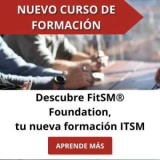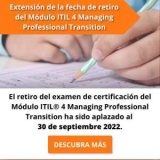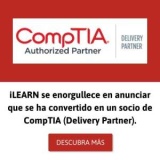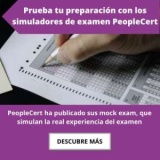- Todos los cursos
- Inteligencia Artificial (AI)
- Gestión de Carteras, Programas y Proyectos
- Gestión de Proyectos Ágil vs Tradicional: una guía para elegir
- Cómo elegir tu marco y curso de gestión de proyectos
- AgileLearn®
- AgileBA® (Agile Business Analyst)
- AgilePM®
- Association for Project Management (APM)
- KanbanLearn®
- MoP®
- MSP®
- P3O®
- Metodología de gestión de proyectos PM²
- PMI®
- Praxis Framework™
- PRINCE2®
- PRINCE2 Agile®
- Programme and Project Sponsorship
- Project Management (ISO 21502)
- SAFe®
- SCRUM
- Gobierno y Gestión de Servicios de TI
- Gestión de Servicios TI: ¿Qué formación elegir?
- COBIT® (COBIT® 5)
- COBIT® 2019
- CompTIA A+
- DevOps
- FitSM®
- ISO/IEC 20000
-
ITIL® 4
- Renovar las certificaciones ITIL
- Cómo pasar de ITIL® v3 a ITIL® 4
- Guía para elegir entre los cursos ITIL® 4 avanzados
- ITIL® Foundation
- ITIL® 4 Extension Modules
- ITIL® 4 Managing Professional
- ITIL® 4 Strategic Leader
- ITIL® 4 Practice Manager
- ITIL® 4 Master
- Lean IT
- SIAM™
- Software Testing
- Certificaciones TOGAF®
- VeriSM™
- Gestión de Cambios, Riesgos y Resiliencia
- Mejora Empresarial
- Seguridad de la Información e Informática
- Macrodatos, Ciencia de datos e Inteligencia artificial
- Computación en la nube, Blockchain e Internet de las cosas
- Privacidad, Protección de Datos y RGPD
- Desarrollo de Software y Gestión de la Infraestructura de TI
- Habilidades Comerciales
- Modificación de Cursos y Exámenes
- Servicios
- Formación continua
- Noticias y Recursos
- Todo sobre iLEARN
- Contactos

 Iniciar sesión
Iniciar sesión





































